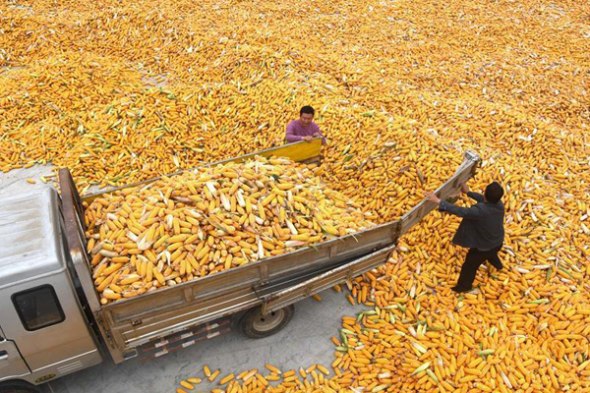
Farmers unload corn in Gouya village of Dazhuang town in Yinan county, East China's Shandong province, Oct 8, 2017. (Photo/Xinhua)
To boost industrial demand for corn and cut emissions, China has launched corn-to-ethanol pilot programs in 2004.
However, the promotion of bioethanol, the cleaner alternative to traditional fuels like diesel and gasoline, remains a challenge even after more than a decade.
It seems not many petrol stations sell E10, an alternative fuel that contains 10 percent ethanol, an alcohol typically produced from corn, in the Chinese capital.
I asked a friend of mine from Shandong province, where bioethanol is available, if she is a fan of the cleaner energy.
It turns out she, like many others, supports traditional fuels despite the fact that the subsidized bioethanol is not only cheaper but more environmentally friendly.
Many experts, including Professor Lou Diming of the School of Automotive Studies, Tongji University, led a biofuel pilot project in Shanghai, and found that drivers said biodiesel didn't negatively affect key vehicle components such as the piston, valve, and the fuel injector.
My friend expressed concern that the fuel blended with ethanol doesn't power up an engine like the traditional fuel.
She is also worried some biofuels might have led to more emissions than those produced by the fossil fuels they were meant to replace.
That worry is not a case in isolation but finds echo in reports from some institutes like the Royal Academy of Engineering in the UK.
According to an RAE report last year, some biofuels made from food crops were increasing food prices and were often as polluting as fossil fuels when all factors in their production were considered.
Bioethanol, which replaces gasoline and is produced from corn, wheat, sugarcane and sugar beet, failed to meet the 50 percent reduction goal when land use change was included, it said.
Despite subsidized bioethanol being cheaper than normal gasoline, most car owners find the gap too small, especially when compared to the potential harm to the vehicle engine from the new fuel.
It seems the only way out is government policy to strictly enforce mandatory rules nationwide that gas stations must sell blended fuel.
China mandated that gasoline supplies should contain 10 percent ethanol last September, as the National Development and Reform Commission and the National Energy Administration rolled out a plan last year to promote the use of ethanol in gasoline as car fuel nationwide by 2020.
Eleven cities already have bioethanol pilot projects. This is significant because China is the world's largest car market. But no formal policy has been announced yet.
A friend of mine who used to work with one of China's major oil giants told me that as bioethanol is more demanding in terms of its storage environment, and has a shorter shelf life, it requires more efforts in terms of distribution, storage, transportation and sales. This makes petrol stations unwilling to sell it. So, unless there is governmental directive, there may not be much progress on this issue.
Considering the wholesale price of bioethanol is more than that of regular petrol, it only makes the promotion of cleaner fuels even more challenging.
In China, regions that encourage bioethanol are places that see large amounts of crops that are not consumed as food. Such places include Henan and Hubei provinces, and the northeastern region, he said.
Although the authorities mandate promotion of biofuels, without specific policies, tax reduction, enterprise subsidies and other measures like those in the United States and Brazil, it'd be a challenge to make private-sector vehicle drivers use them.
Well, China is currently the world's third-largest ethanol producer. But with output of about 2.1 million tons a year, production might still be a long way behind global leaders Brazil and the US.
Since long-term or endless subsidies may not be practical, China might work on achieving technological breakthroughs to boost efficiency and lower prices of biofuels.


















































